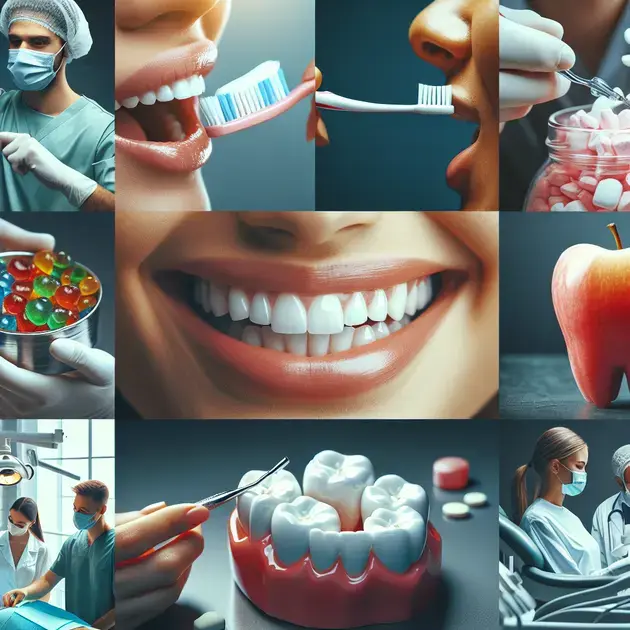When it comes to oral health, one of the most common issues individuals face is tooth decay. Understanding the causes, prevention methods, and treatments for tooth decay is crucial for maintaining a healthy smile.
Recent studies have shown a concerning increase in tooth decay cases among children, emphasizing the importance of educating both children and adults on proper oral hygiene practices. By addressing the causes of tooth decay and implementing effective prevention strategies, we can work towards reducing the prevalence of this dental problem.

Causes of Tooth Decay
Tooth decay is primarily caused by the accumulation of plaque on the teeth. Plaque is a sticky film of bacteria that forms on the teeth when sugars and starches from food interact with the bacteria in the mouth. When plaque is not removed through regular brushing and flossing, it can produce acids that eat away at the tooth enamel, leading to cavities.
Another common cause of tooth decay is the consumption of sugary and acidic foods and beverages. These substances create an acidic environment in the mouth, which can weaken the enamel and make the teeth more susceptible to decay. Additionally, poor oral hygiene practices, such as infrequent brushing and flossing, can contribute to the development of cavities.
Medical conditions such as dry mouth and acid reflux can also increase the risk of tooth decay. Dry mouth reduces the production of saliva, which plays a crucial role in washing away food particles and neutralizing acids in the mouth. Acid reflux exposes the teeth to stomach acids, which can erode the enamel and promote decay.
Furthermore, certain medications, such as antihistamines and antidepressants, can cause dry mouth as a side effect, further raising the risk of tooth decay. Genetics may also play a role in determining an individual’s susceptibility to cavities, as some people naturally have weaker enamel or produce less saliva, making them more prone to decay.
To prevent tooth decay caused by plaque buildup, it is essential to practice good oral hygiene habits, including brushing your teeth at least twice a day with fluoride toothpaste and flossing daily. Regular dental check-ups and cleanings can help detect and treat decay in its early stages, preventing more extensive damage to the teeth.
Effective Prevention Methods
Preventing tooth decay requires a combination of proper oral hygiene practices and dietary choices. Brushing your teeth with fluoride toothpaste after meals and before bedtime helps remove plaque and strengthen the enamel, reducing the risk of decay. Flossing daily is also crucial for cleaning between the teeth and along the gumline, where plaque often accumulates.
Avoiding sugary and acidic foods and beverages can help maintain a healthy oral environment and prevent the erosion of enamel. Instead, opt for foods high in calcium and phosphates, such as dairy products, nuts, and leafy greens, which can strengthen the teeth and neutralize acids in the mouth. Drinking fluoridated water and using fluoride mouthwash can further enhance the protective properties of the enamel.
Applying dental sealants to the molars can provide an additional barrier against plaque and bacteria, especially for children who may have difficulty reaching these areas with their toothbrush. Sealants are thin coatings that bond to the chewing surfaces of the teeth, protecting them from decay.
Eating a balanced diet rich in vitamins and minerals, maintaining proper hydration, and avoiding tobacco products are also important factors in preventing tooth decay. Limiting snacking between meals and practicing moderation with sugary treats can help reduce the frequency of acid attacks on the teeth, preserving their health and integrity.
For individuals at high risk of tooth decay, such as those with dry mouth or a history of cavities, your dentist may recommend additional preventive measures, such as prescription fluoride toothpaste or mouth rinse. Following your dentist’s personalized recommendations and attending regular check-ups are essential for maintaining optimal oral health and preventing decay.
Treatment Options
The treatment for tooth decay varies depending on the severity of the condition. In the early stages, when cavities are small and confined to the enamel, the decay can often be reversed through remineralization. This process involves the use of fluoride treatments or dental products that promote the remineralization of weakened enamel, restoring its strength and preventing further damage.
If the decay has progressed beyond the enamel and reached the dentin or pulp of the tooth, more extensive treatment may be required. The most common approach is to remove the decayed portion of the tooth and fill the cavity with a dental filling material, such as amalgam or composite resin. This restores the tooth’s shape and function while preventing the progression of decay.
In cases where the decay has caused significant damage to the tooth structure, such as deep cavities or infections, a root canal treatment may be necessary to save the tooth. During a root canal, the infected pulp is removed, and the root canal is cleaned and sealed to prevent further infection. A dental crown is typically placed over the tooth to protect it and restore its appearance.
For severely damaged or decayed teeth that cannot be saved through conventional treatments, extraction may be the only option. Tooth extraction involves removing the affected tooth to prevent the spread of infection and alleviate pain. Depending on the location of the missing tooth, options such as dental implants, bridges, or dentures may be recommended to restore function and aesthetics.
Regardless of the treatment option chosen, maintaining good oral hygiene practices and attending regular dental check-ups are essential for preventing future decay and preserving the health of your teeth. Your dentist can provide personalized recommendations for treatment and preventive care based on your individual needs and oral health status.

Regular Dental Check-Ups
Regular dental check-ups are essential for maintaining good oral health. Dentists recommend visiting them at least twice a year to prevent potential dental issues. During these check-ups, dentists can identify early signs of cavities, gum disease, or other oral health problems. By detecting these issues early, patients can avoid more extensive and costly treatments in the future.
During a regular dental check-up, the dentist will conduct a thorough examination of your teeth and gums. They will also perform a professional cleaning to remove plaque and tartar buildup. Additionally, the dentist may take X-rays to check for any hidden dental problems that are not visible to the naked eye.
It is important to schedule regular dental check-ups even if you are not experiencing any pain or discomfort. Prevention is key in maintaining good oral health, and regular check-ups can help detect and address issues before they escalate into more serious problems.
Overall, regular dental check-ups are crucial for preventing dental problems, maintaining oral hygiene, and preserving your overall health. By prioritizing these routine appointments, you can ensure a healthy and happy smile for years to come.
Healthy Diet Practices
Following healthy diet practices is not only beneficial for your overall health but also for your oral hygiene. Consuming a balanced diet rich in nutrients can help strengthen your teeth and gums, reducing the risk of dental issues such as cavities and gum disease. Incorporating foods high in calcium, vitamins, and minerals can support your oral health.
On the other hand, consuming sugary and acidic foods and beverages can contribute to tooth decay and erosion. It is important to limit the intake of these items and opt for healthier alternatives such as fruits, vegetables, and dairy products. Drinking plenty of water throughout the day can also help wash away food particles and bacteria that can lead to plaque buildup.
In addition to choosing the right foods, practicing good eating habits can also benefit your oral hygiene. Avoid snacking frequently between meals, as this can expose your teeth to prolonged acid attacks. Instead, try to consume balanced meals and brush your teeth afterwards to maintain a healthy mouth.
By incorporating healthy diet practices into your daily routine, you can support both your overall health and your oral hygiene. Making nutritious food choices and following good eating habits can contribute to a beautiful and radiant smile.
Importance of Oral Hygiene
The importance of oral hygiene cannot be emphasized enough when it comes to maintaining good dental health. Proper oral hygiene practices, such as brushing your teeth twice a day, flossing regularly, and using mouthwash, are crucial for preventing dental issues and maintaining a healthy mouth.
In addition to daily oral care at home, regular dental check-ups are essential for addressing any potential problems early on. Dentists can provide professional cleanings, check for signs of decay or gum disease, and offer valuable advice on how to improve your oral hygiene routine.
Poor oral hygiene can lead to a variety of dental problems, including bad breath, cavities, and gum disease. Neglecting your oral health can also have broader impacts on your overall well-being, as oral issues have been linked to systemic conditions such as heart disease and diabetes.
By prioritizing oral hygiene and scheduling regular dental check-ups, you can maintain a healthy smile and prevent more serious dental issues in the future. Investing time and effort into caring for your teeth and gums can have long-lasting benefits for your dental health and overall quality of life.
**
Conclusion
**
Regular dental check-ups are essential for maintaining good oral health as they allow dentists to detect early signs of dental issues like cavities and gum disease. By visiting the dentist at least twice a year, individuals can prevent costly treatments in the future and ensure long-term oral well-being. During these check-ups, a thorough examination, professional cleaning, and X-rays help in identifying hidden problems that might not be visible otherwise.
Healthy diet practices play a pivotal role in supporting oral hygiene and overall health. Consuming a balanced diet rich in nutrients such as calcium, vitamins, and minerals strengthens teeth and gums, reducing the risk of dental problems. Avoiding sugary and acidic foods and opting for fruits, vegetables, and dairy products can prevent tooth decay and erosion. Good eating habits, like avoiding frequent snacking and brushing teeth after meals, contribute to maintaining a healthy mouth and radiant smile.
The importance of oral hygiene cannot be overstated in maintaining good dental health. Daily practices like brushing teeth twice a day, flossing regularly, and using mouthwash are essential for preventing dental issues and ensuring a healthy mouth. Neglecting oral hygiene can lead to problems like bad breath, cavities, and gum disease, with broader impacts on overall well-being. Prioritizing oral hygiene and regular dental check-ups help in preventing serious dental issues, promoting a healthy smile, and improving overall quality of life.